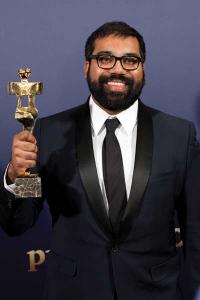You are here
Ian Harnarine
Ian Harnarine
Filmmaker and Adjunct Faculty
Institution:New York University
Location:Toronto, Canada
Education:
University of Illinois at Chicago
When I was an undergraduate at York University in Toronto, I did a lot of work with the high energy physics group. We were part of the international ZEUS Collaboration, which ran a large particle detector at the photon-proton collider at the Deutsches Elektronen-Synchrotron (DESY) in Hamburg, Germany. I helped to construct particle detectors and spent a summer at DESY. That experience changed my life. It was my first time “on my own,” completely immersed in a foreign culture with a foreign language. It was also when I realized that I wanted to pursue graduate studies in physics, because the work I was doing was so awe inspiring. In addition to the experiments at DESY, I also did a research project analyzing images from the Hubble Space Telescope and the extrasolar planet hunter Kepler (then in its development phase).
In grad school at the University of Illinois at Chicago, I was part of the Phobos Collaboration, working on a high energy experiment based at the Relativistic Heavy Ion Collider (RHIC) at Brookhaven National Laboratory in Upton, New York. I worked in the tunnel and did data analysis that resulted in my thesis, “A Study of Pile-up in 200 GeV Au+Au Collisions at RHIC.”
Ultimately, though, I lost my passion for doing research. Don’t get me wrong. I still love physics and the pursuit of knowledge. But when I looked at my grad school friends and professors, I saw that they were really immersed; they could feel fulfilled by hours of solving equations and coding. I just didn’t get as much satisfaction from that kind of work. What I did find fascinating and fulfilling was learning about the people I was working with. I loved hearing their stories and discovering what motivated them to do what they do. That’s when it hit me. I was far more interested in the story of science and scientists than in the actual day-to-day work of being a scientist. I decided to become a filmmaker.
There is no doubt that my training in physics has a profound impact on me as a filmmaker. It taught me how to think in a disciplined, critical, and unbiased way. It also taught me how to look at a problem from different angles and try different approaches to solving it. When I find myself analyzing films and scripts, there are patterns that appear in every story. I’ve learned how to identify them, use them, and, ultimately, subvert them in my own work.
Like research, filmmaking is an incredibly collaborative effort involving many people. Knowing how to work with others to achieve a single goal is something I learned while being a part of physics collaborations. The ultimate goal is different, but the ins and outs of managing and connecting with people are very much the same.
I’m currently working on the movie Time Traveler with Spike Lee. It’s the true story of Ronald Mallett, who teaches at the University of Connecticut and is trying to build the world’s first time machine. The story is incredible and involves a lot of theoretical physics, but mostly it’s a father-son story. To me, it’s the perfect blend of science and heart.
Like research, filmmaking is an incredibly collaborative effort involving many people. Knowing how to work with others to achieve a single goal is something I learned while being a part of physics collaborations. The ultimate goal is different, but the ins and outs of managing and connecting with people are very much the same.
Links:Harnarine’s short film, "Doubles with Slight Pepper"
Job Sector:
